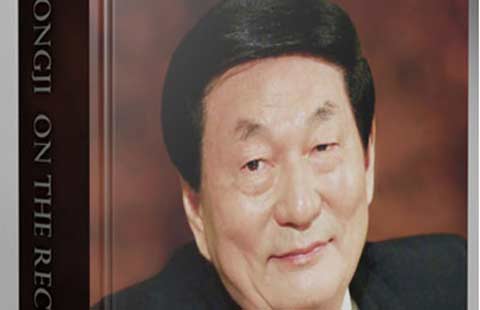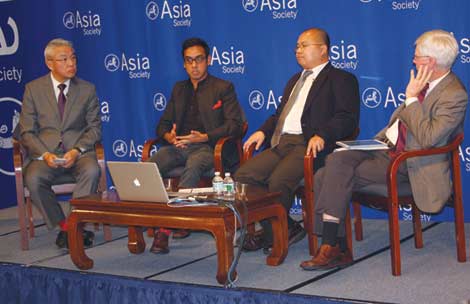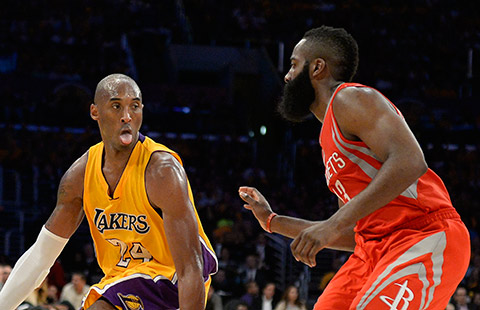Republican 'establishment' squeezes Tea Party
Updated: 2014-05-18 23:11
(Agencies)
|
|||||||||
BOISE, Idaho - On a recent Saturday, foot soldiers in the Republican Party's civil war fanned out across a neighborhood of winding streets and manicured lawns to beat back the Tea Party.
They did not meet much resistance. Over the course of two hours, dozens of residents said they planned to vote in the May 20 primary election for Idaho Representative Mike Simpson, a veteran lawmaker with a reputation for pragmatism. None said they would back his Tea Party challenger Bryan Smith.
As he heads for a likely victory on Tuesday, Simpson has plenty of help. The US Chamber of Commerce, former Republican presidential candidate Mitt Romney and the National Rifle Association have joined with groups representing hospitals, dentists and home sellers to try to return him to Congress for an eighth term.
The push is part of a wider drive by so-called establishment Republicans to back mainstream candidates and prevent Tea Party figures like Smith from winning primaries ahead of the Nov. 4 midterm elections.
They fear a repeat of some key races in previous congressional elections when Tea Party insurgents alienated independents and lost to Democrats. Party elders still smart at the loss of a US Senate contest in Missouri in 2012 which was blamed on comments about "legitimate rape" by Republican candidate Todd Akin.
While the Tea Party movement has helped Republicans win significant spending cuts and thwart some of President Barack Obama's agenda, it also forced a messy shutdown of the US government in 2013 that was unpopular with voters.
In Idaho, organizations that have spent more than $2 million to back veteran Republican Simpson look likely to get a return on their investment, thanks to a deluge of TV advertising and months of door-knocking by workers like Stacey Barrack.
"We talk about his conservative record and everything he's done in office, and it's worked," said Barrack, 28. She entered details of each doorstep encounter into her smart phone.
Working closely together, the pro-Simpson groups have created a shadow campaign of sorts that mirrors, and outspends, the functions of the candidate's own campaign, sharing data from door-knocking efforts and telephone surveys to determine what messages work best and coordinating their ad buys to ensure they are not duplicating their efforts.
"Everybody does their own product, but we try to make sure everything marries up," said Scott Reid of the US Chamber, which was the first group to run ads for Simpson and has spent the most money in the race.
One of its TV ads features an endorsement for Simpson from Romney, still a pillar of the Republican establishment despite his 2012 loss to Obama.
Barrack and the other door knockers have been hired by Defending Main Street, a group funded in part by the Laborers Union and the Operating Engineers Union, which unlike most other labor unions give money to both political parties.
As a senior member of the House Appropriations Committee, Simpson is the kind of influential, practical-minded Republican who professional associations are keen to cultivate. Lobbyists say his deep knowledge of a wide range of issues, from nuclear energy to forestry, makes him a valuable ally.
The NRA has mailed out flyers for him and the National Association of Realtors has paid for online video ads. The American Hospital Association and the American Dental Association have paid for polls, mail and TV and radio spots.
- Xinjiang publishes anti-terror brochures
- Security pact sealed with Afghanistan
- President Xi encourages international cultural exchanges
- Premier Li: China willing to help Afghan infrastructure
- Chinese FM: China, Asia-Pacific become community of shared destiny
- Foreign minister remarks on possibility of China-Japan summit
Most Viewed
Editor's Picks

|

|

|

|

|

|
Today's Top News
VW defends safety of recalled New Sagitar
Former premier makes Hurun philanthropists list
Xinjiang publishes anti-terror brochures
SOHO endows $10m to Yale
Cook and Ma talk about partnership
Language a barrier to healthcare for Asian Americans
China businesses need innovation: VC
Security pact sealed with Afghanistan
US Weekly

|

|
















